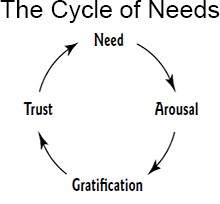
Touch is critical to human development. Loving touch sets in motion a healthy attachment. Attachment, in turn, is the context in which all development—cognitive, social, emotional, physical and neurological—becomes possible. In essence, our attachment to a nurturing caregiver sets in motion all facets of our human development. Attachment, in family life, is also the blueprint for all subsequent close relationships. Attachment is a relationship!
If you have parented (or cared for) an infant, stop for a moment and think about the hours you spent holding, stroking, touching, rocking, caressing, kissing and hugging the baby. As your child grew, touching and holding continued—hugs and kisses before getting on the school bus or while bandaging a boo-boo, snuggling while watching television or reading books, pats on the back for accomplishments, stroking hair as a gesture of affection, and lots of kisses and caresses just out of love!
As a result of consistent and predictable parental nurture and support—the cycle of needs—this child develops a secure attachment. The child trusts his parents to meet his needs, “My parents are always there for me.” He feels good about himself, “I am worthwhile.” He seeks out his parents when he needs help or comfort, “I can rely on my parents.” He has absorbed the skills to navigate life. He can develop solutions, handle stress, regulate emotions, follow directions, complete tasks, and the list goes on.
He demonstrates empathy and remorse, “I have hurt Mom’s feelings. I need to make this right.” He strives to have fun. He explores his environment. He seeks parental praise for a job well-done, “I want to please my parents.” He enjoys intimacy. He seeks out companionship, “I want to be around others.” He can do all of these things within relationships with parents, his brothers and sisters, peers, teachers, coaches, neighbors, etc. His blue-print is “I am safe within relationships.” He applies his secure model of attachment to all human interactions.
In adulthood, this secure attachment will allow him to continue to have close interpersonal relationships. He will feel love and give love. He will understand his past—emotional baggage will not interfere with his capacity to interact in his marriage, with his children, in his career and so on!
If you have parented (or cared for) an infant, stop for a moment and think about the hours you spent holding, stroking, touching, rocking, caressing, kissing and hugging the baby. As your child grew, touching and holding continued—hugs and kisses before getting on the school bus or while bandaging a boo-boo, snuggling while watching television or reading books, pats on the back for accomplishments, stroking hair as a gesture of affection, and lots of kisses and caresses just out of love!
As a result of consistent and predictable parental nurture and support—the cycle of needs—this child develops a secure attachment. The child trusts his parents to meet his needs, “My parents are always there for me.” He feels good about himself, “I am worthwhile.” He seeks out his parents when he needs help or comfort, “I can rely on my parents.” He has absorbed the skills to navigate life. He can develop solutions, handle stress, regulate emotions, follow directions, complete tasks, and the list goes on.
He demonstrates empathy and remorse, “I have hurt Mom’s feelings. I need to make this right.” He strives to have fun. He explores his environment. He seeks parental praise for a job well-done, “I want to please my parents.” He enjoys intimacy. He seeks out companionship, “I want to be around others.” He can do all of these things within relationships with parents, his brothers and sisters, peers, teachers, coaches, neighbors, etc. His blue-print is “I am safe within relationships.” He applies his secure model of attachment to all human interactions.
In adulthood, this secure attachment will allow him to continue to have close interpersonal relationships. He will feel love and give love. He will understand his past—emotional baggage will not interfere with his capacity to interact in his marriage, with his children, in his career and so on!